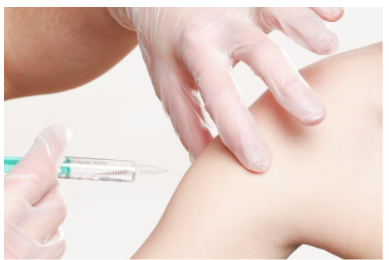
What is it that prevents a child to suffer from a disease he/ she is vaccinated against? Give one reason.
Answer
591k+ views
Hint: Vaccine is a biological substance that helps an individual (who is vaccinated) build passive immunity against a particular disease. The immune system itself fights with the pathogens.
Complete answer: Vaccine is a biological substance, active or inactive, which builds acquired immunity to fight a specific disease when injected to a person.
Generally, a vaccine is made up of one of the following things: a substance that resembles a disease-causing agent or microorganism, the entire inactivated causative agent, or a weakened microbe. So, actually the immune system of a person who is vaccinated prevents a child to suffer from a specific disease.
Reason: Generally, the coat or membrane proteins of the causative agents/microbes stimulate immune reactions in the host’s body. The immune system then works and fights against it and mostly protects the host from further infection with the same pathogen. Based on this principle vaccine is prepared.
Example: There are several vaccines that build immunity e.g. Polio, Hepatitis B, Pox, Measles, etc.

Note: Vaccine and vaccination –these words derived from the name of a cowpox virus Vaccinia. Dr. Edward Jenner was from Gloucestershire, England; he put forward the idea of the vaccine when he injected the vaccine (prepared from the pus of cowpox lesions) into the arm of a little boy named James Phipps and the boy did not develop any infection (even on exposure to the disease).
Complete answer: Vaccine is a biological substance, active or inactive, which builds acquired immunity to fight a specific disease when injected to a person.
Generally, a vaccine is made up of one of the following things: a substance that resembles a disease-causing agent or microorganism, the entire inactivated causative agent, or a weakened microbe. So, actually the immune system of a person who is vaccinated prevents a child to suffer from a specific disease.
Reason: Generally, the coat or membrane proteins of the causative agents/microbes stimulate immune reactions in the host’s body. The immune system then works and fights against it and mostly protects the host from further infection with the same pathogen. Based on this principle vaccine is prepared.
Example: There are several vaccines that build immunity e.g. Polio, Hepatitis B, Pox, Measles, etc.

Note: Vaccine and vaccination –these words derived from the name of a cowpox virus Vaccinia. Dr. Edward Jenner was from Gloucestershire, England; he put forward the idea of the vaccine when he injected the vaccine (prepared from the pus of cowpox lesions) into the arm of a little boy named James Phipps and the boy did not develop any infection (even on exposure to the disease).
Recently Updated Pages
Master Class 12 Economics: Engaging Questions & Answers for Success

Master Class 12 Physics: Engaging Questions & Answers for Success

Master Class 12 English: Engaging Questions & Answers for Success

Master Class 12 Social Science: Engaging Questions & Answers for Success

Master Class 12 Maths: Engaging Questions & Answers for Success

Master Class 12 Business Studies: Engaging Questions & Answers for Success

Trending doubts
Which are the Top 10 Largest Countries of the World?

What are the major means of transport Explain each class 12 social science CBSE

Draw a labelled sketch of the human eye class 12 physics CBSE

Why cannot DNA pass through cell membranes class 12 biology CBSE

Differentiate between insitu conservation and exsitu class 12 biology CBSE

Draw a neat and well labeled diagram of TS of ovary class 12 biology CBSE




